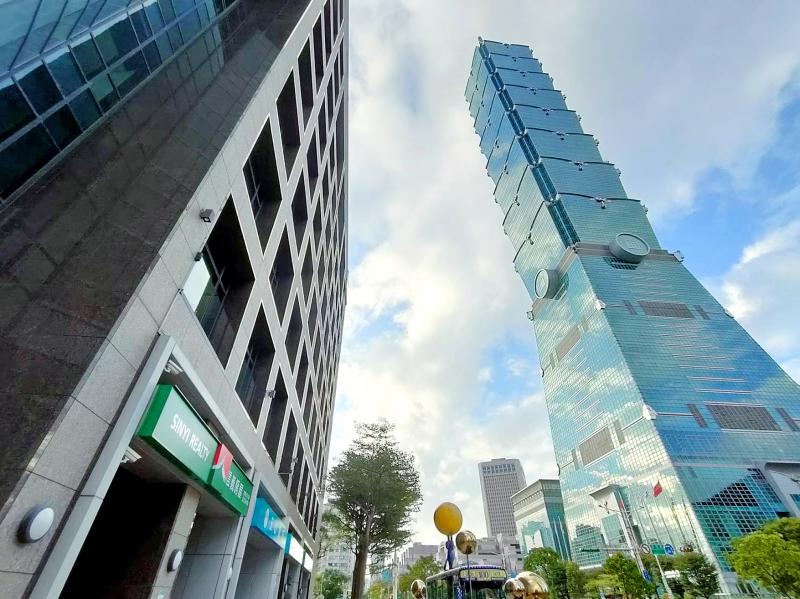Rent for grade A office space in Taipei gained 4.4 percent this quarter to NT$2,953 (US$99.63) per ping (3.3m2), with vacancy rates hovering around historic lows of 2 percent amid continued demand from tech and non-tech firms, the local branch of Jones Lang LaSalle Inc (JLL) said yesterday.
The vacancy rate made Taiwan the best performer in Asia, despite the COVID-19 pandemic, JLL Taiwan Ltd (仲量聯行) said.
The commercial property market — especially office buildings, which generate stable rental income — was resilient even as COVID-19 cases increased, JLL Taiwan managing director Tony Chao (趙正義) said.

Photo: Hsu Yi-ping, Taipei Times
INSURERS
Office spaces are particularly attractive to local life insurance companies which need to park funds and defend against inflation, Chao added.
Taiwan’s low vacancy rate also has to do with high-tech firms and traditional manufacturers expanding their capacity to accommodate increasing business, Chao said.
Some landlords have taken advantage of the pandemic this quarter to upgrade their office spaces to make them more environmental friendly and competitive, he said.
Vacancy rates were the lowest in Taipei’s Nangang District (南港) at 0.8 percent in the April-to-June period, supported by demand for large headquarters and the city government’s promotion of the suburban area, JLL Taiwan said.
Vacancy rates in Neihu District (內湖) fell below 4 percent due in part to limited supply, it said.
JLL Taiwan stood by its expectations that vacancy rates would remain between 2 and 4 percent for the next three years on the back of solid demand from local firms.
URBAN RENEWAL
Urban renewal efforts would help fuel relocation needs and accelerate digestion of new spaces, the broker said.
There might be 100,000 ping of new office space added in the next five years, giving tenants more options, it said.

MULTIFACETED: A task force has analyzed possible scenarios and created responses to assist domestic industries in dealing with US tariffs, the economics minister said The Executive Yuan is tomorrow to announce countermeasures to US President Donald Trump’s planned reciprocal tariffs, although the details of the plan would not be made public until Monday next week, Minister of Economic Affairs J.W. Kuo (郭智輝) said yesterday. The Cabinet established an economic and trade task force in November last year to deal with US trade and tariff related issues, Kuo told reporters outside the legislature in Taipei. The task force has been analyzing and evaluating all kinds of scenarios to identify suitable responses and determine how best to assist domestic industries in managing the effects of Trump’s tariffs, he

TIGHT-LIPPED: UMC said it had no merger plans at the moment, after Nikkei Asia reported that the firm and GlobalFoundries were considering restarting merger talks United Microelectronics Corp (UMC, 聯電), the world’s No. 4 contract chipmaker, yesterday launched a new US$5 billion 12-inch chip factory in Singapore as part of its latest effort to diversify its manufacturing footprint amid growing geopolitical risks. The new factory, adjacent to UMC’s existing Singapore fab in the Pasir Res Wafer Fab Park, is scheduled to enter volume production next year, utilizing mature 22-nanometer and 28-nanometer process technologies, UMC said in a statement. The company plans to invest US$5 billion during the first phase of the new fab, which would have an installed capacity of 30,000 12-inch wafers per month, it said. The

Taiwan’s official purchasing managers’ index (PMI) last month rose 0.2 percentage points to 54.2, in a second consecutive month of expansion, thanks to front-loading demand intended to avoid potential US tariff hikes, the Chung-Hua Institution for Economic Research (CIER, 中華經濟研究院) said yesterday. While short-term demand appeared robust, uncertainties rose due to US President Donald Trump’s unpredictable trade policy, CIER president Lien Hsien-ming (連賢明) told a news conference in Taipei. Taiwan’s economy this year would be characterized by high-level fluctuations and the volatility would be wilder than most expect, Lien said Demand for electronics, particularly semiconductors, continues to benefit from US technology giants’ effort

‘SWASTICAR’: Tesla CEO Elon Musk’s close association with Donald Trump has prompted opponents to brand him a ‘Nazi’ and resulted in a dramatic drop in sales Demonstrators descended on Tesla Inc dealerships across the US, and in Europe and Canada on Saturday to protest company chief Elon Musk, who has amassed extraordinary power as a top adviser to US President Donald Trump. Waving signs with messages such as “Musk is stealing our money” and “Reclaim our country,” the protests largely took place peacefully following fiery episodes of vandalism on Tesla vehicles, dealerships and other facilities in recent weeks that US officials have denounced as terrorism. Hundreds rallied on Saturday outside the Tesla dealership in Manhattan. Some blasted Musk, the world’s richest man, while others demanded the shuttering of his